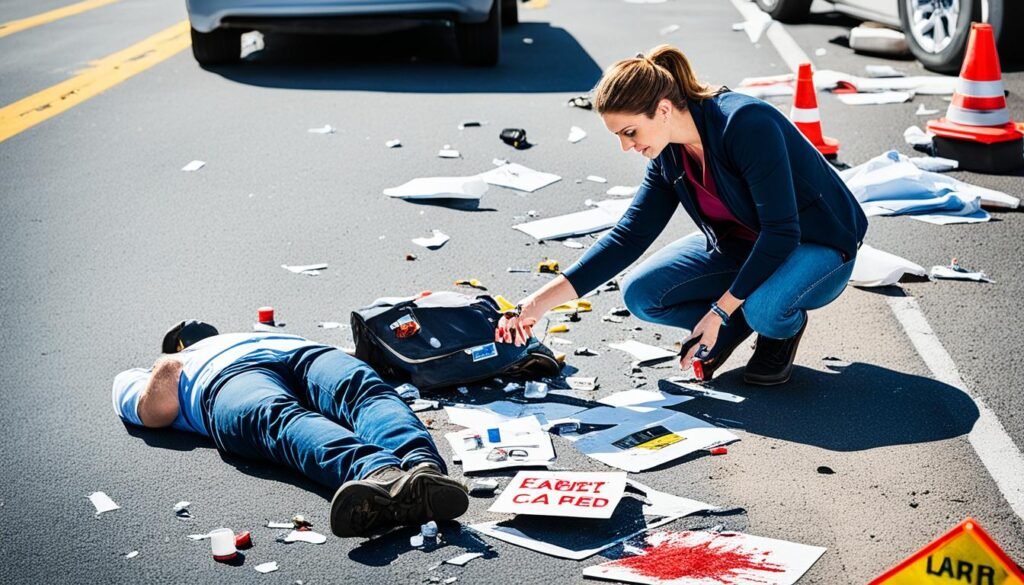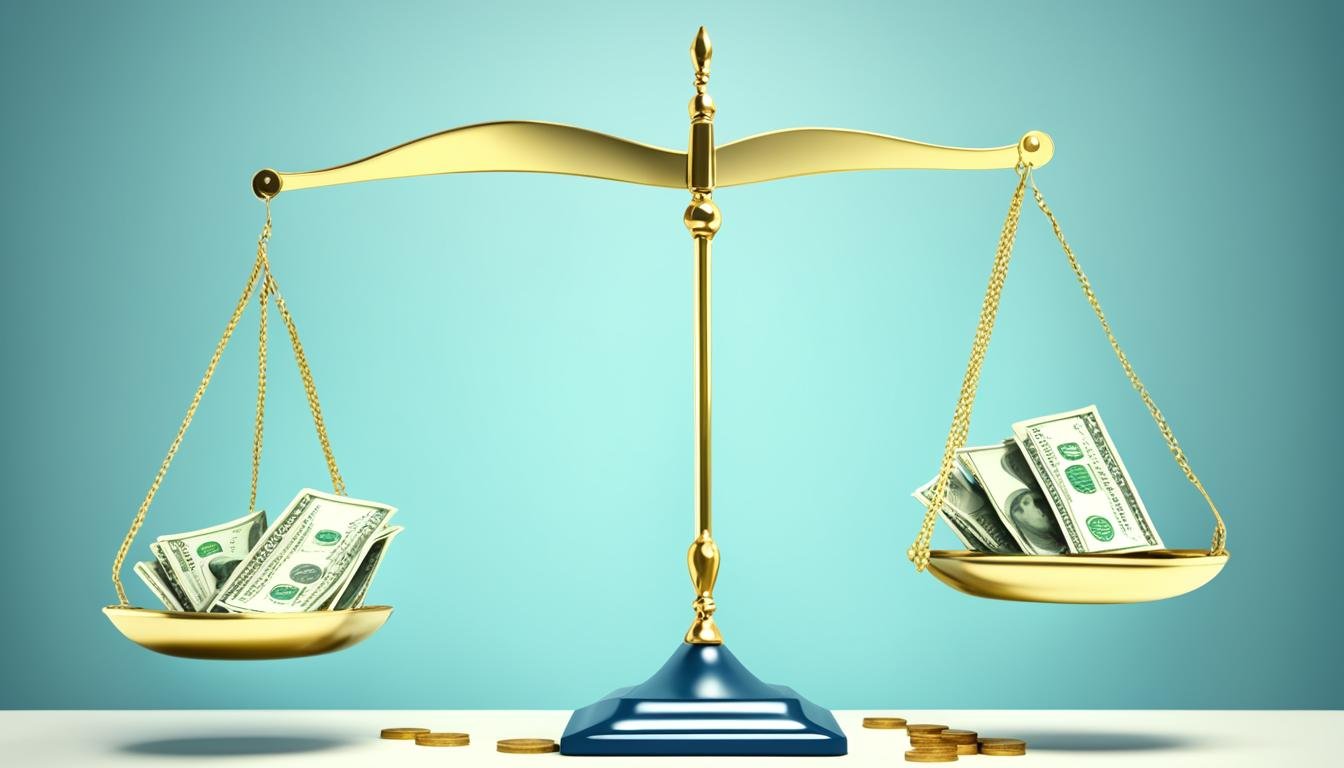Did you know settling personal injury claims might take a long time? It could last months to years. The timeline to settle these claims varies, depending on several things. Knowing the process and having a good lawyer can greatly help. We’ll look at how long it usually takes and where to find top lawyers for help.
Key Takeaways:
- Personal injury claims can take a significant amount of time to settle.
- The timeline for settling a claim depends on various factors.
- Super attorneys can provide valuable guidance throughout the settlement process.
- It is important to consult with an experienced personal injury lawyer to protect your rights.
- Don’t hesitate to reach out to Super Attorneys of Irvine at 949-996-9546 for assistance with your personal injury claim.
Understanding the Personal Injury Lawsuit Timeline
Understanding the steps of a personal injury lawsuit is key. Every case is different, and how long it takes can change based on many things. Let’s look at the basic steps of a personal injury claim:
- Accident or Incident: Everything starts when the accident or incident happens. This is when your claim begins.
- Seeking Medical Treatment: Getting medical help after an accident is crucial. It not only prioritizes your health but also supports your claim.
- Consulting a Personal Injury Lawyer: Talking to a lawyer who knows personal injury cases is wise. They can help you understand your rights and what to do next.
- Investigation Phase: This step involves collecting evidence like medical records and witness statements. It helps to analyze how complex your case is.
- Settlement Negotiations: Often, your lawyer will talk with the insurance company to try and reach a fair deal without going to court.
- Lawsuit Filing: If no settlement is reached, your lawyer might file a lawsuit. This officially starts the court process.
- Discovery Phase: Both sides share information, like documents and witness accounts. This helps everyone understand the case better.
- Mediation and Settlement: Mediation tries to settle the case without a trial. A neutral person helps both sides talk and possibly reach an agreement.
- Trial: If mediation doesn’t work, the case goes to trial. The evidence is shown, and then a judge or jury makes a decision.
The length of a personal injury lawsuit can change with your case’s complexity, court schedules, and other details. It’s critical to have a personal injury lawyer to help know your specific timeline and smoothly go through the process.

Having a skilled attorney with you in a personal injury lawsuit matters. They fight for your rights, deal with negotiations, and walk you through everything legally.
The Accident and Gathering Evidence
Personal injury cases come from many incidents. These can be auto accidents, medical mistakes, slips, falls, or animal bites. After an accident, collecting evidence is key. This includes photos and videos of the scene. Also, identify what caused the accident and contact the police for a report. Get contact info of everyone involved and any witnesses. These steps show the other party’s fault and the damage done.
Evidence is crucial for proving negligence in personal injury cases. Documenting the accident details gives important information that backs up your claim. Photos and videos show what the scene looked like, any injuries, damage, or dangerous conditions. This visual evidence is important for showing who was at fault.
Getting an official police report is also important. It offers an unbiased view of the accident, noting time, date, location, and statements from those involved and witnesses. This report is strong proof of the accident happening and backs up your story.
Witness statements are important too. Getting contact info from witnesses lets you gather their views, making your case stronger. Witnesses give insight into the accident’s cause and the other party’s negligence.
In personal injury cases, it’s crucial to prove negligence to establish liability. Negligence is failing to be careful, leading to injury. By showing evidence of the other party’s carelessness, you make your claim stronger. This improves your chance to get the compensation you deserve.
Remember, the more evidence you gather, the stronger your case becomes. Consult with a personal injury lawyer to ensure you are collecting the right evidence and to guide you through the process.
To illustrate the importance of evidence gathering, here is a visual representation of the steps involved:

Evidence Gathering Process for Personal Injury Claim:
| Steps | Description |
|---|---|
| 1. Photographs and Videos | Take clear photos and videos of the accident scene, injuries, property damage, and any other relevant details. |
| 2. Identify the Cause | Determine the cause of the accident and gather evidence that establishes the other party’s negligence. |
| 3. Police Report | Contact the police to file an official report of the accident. Obtain a copy of the report for your records. |
| 4. Witness Statements | Get the contact information of witnesses and collect their statements regarding the accident. |
Evidence gathering is key in making a strong personal injury claim. It shows the cause of the accident, proves negligence, and supports your need for fair compensation. By working with a personal injury lawyer, you get expert advice on gathering evidence. This increases your chance of a successful claim.
Seeking Medical Treatment and Documenting Injuries
If you get hurt, see a doctor right away. It’s important for your health and helps your injury claim. A doctor’s visit can show how bad your injuries are and provide needed proof for your claim.
Keep detailed records of all your medical care. This includes visits to the doctor, your medical bills, any medicine you take, surgeries, and any tests or reports. These records are key evidence. They show how serious your injuries are and the costs of your medical care.
Always follow your doctor’s advice and go to your follow-up appointments. Doing what your doctor says helps you get better and proves the lasting effects of your injuries. This can make your case stronger and help you get fair compensation.
Maximizing Your Personal Injury Claim
If you want to maximize your personal injury claim, it is essential to seek medical treatment promptly and thoroughly document your injuries. By doing so, you establish a strong foundation of evidence that demonstrates the impact of the accident on your physical well-being and finances.
It’s also important to keep all documents related to your medical costs. Save every receipt, bill, and insurance statement. These items clearly show the money you’ve spent because of your injury. They are powerful proof of your financial losses, helping increase your claim’s value.
By focusing on your medical care, recording your injuries, and keeping detailed cost records, you’re helping strengthen your claim. Getting advice from a skilled personal injury lawyer can also boost your chances of winning.
Consulting a Personal Injury Lawyer
If you’ve been hurt, talking to a personal injury lawyer is vital. They protect your interests and guide you through the legal maze. These lawyers give you advice, help with decisions, and protect your rights during your case.
When picking a personal injury lawyer, their experience matters a lot. Choose someone who knows personal injury law well. Their deep knowledge will really help your case.
It’s also key to pick a lawyer who knows your local court system. Someone familiar with your area’s laws and procedures can fight better for your rights. They can also improve your chances of getting a fair deal.
Choosing a lawyer with a good track record is important. A lawyer with success in personal injury cases knows how to handle yours. They’re good at dealing with insurance companies, building a solid case, and standing up for you in court. This gives you confidence in your claim.
Talking to a personal injury lawyer helps a lot. They guide you from the first meeting to the end of your case. A skilled lawyer ensures your rights are safe. They also work to get you fair pay for your injuries.
Choosing the Right Attorney: Key Points to Consider
- Specialization: Find a lawyer who’s great at personal injury law. This means they can handle your case well.
- Local Experience: A lawyer who knows local law has a better shot at defending your rights.
- Track Record: Pick a lawyer who has won personal injury cases before. This shows they can manage your claim.
Keep these points in mind and seek a personal injury lawyer’s advice. Doing this, you’ll better navigate the legal system. Plus, you’ll increase your odds of getting the settlement you deserve.
The Investigation and Legal Options
Once you’ve picked a personal injury lawyer, they get to work on your case right away. They start by collecting proof and checking if your claim stands strong.
The personal injury claim investigation covers a few main areas:
- Interviewing You: Your lawyer chats with you to grasp what happened. This helps figure out who’s at fault and where to get compensation.
- Assessing Medical Records and Bills: They look over your medical info and bills. This shows how hurt you are and how much it costs. It’s key for a good case.
- Consulting Experts: For tricky cases, your lawyer might talk to experts. These could be crash specialists or doctors, to understand your losses better.
The evidence collected is crucial for showing how strong your case is. Your lawyer will lay out your legal options in your personal injury case. They’ll explain the good and bad of each.
Strong evidence and knowing your legal paths are vital for a solid claim.
Gathering Sufficient Evidence
In a personal injury case, having strong evidence makes a big difference. You need to clearly show the other party was at fault with strong, well-documented arguments.
“The strength of your evidence can significantly impact the outcome of your personal injury claim. Make sure to gather all relevant documentation and consult with your lawyer to ensure you have a strong case.” – Super Attorneys of Irvine
To boost your case, gather things like photos, videos, witness stories, and expert views. This helps prove your point and can lead to a better result.
Understanding Your Legal Options
During the investigation, your lawyer looks at how strong your case is. They then talk about what you could do legally. It’s key to know these options well to make smart choices for your claim.
Your lawyer might suggest:
- Filing a personal injury lawsuit to get compensation in court.
- Talking it out with the other party or their insurance to settle.
- Checking out other ways to solve the dispute, like mediation or arbitration.
Each choice has its pros and cons. Your lawyer will help you understand them. This way, you can choose what’s best for you.
Settlement and the Lawsuit Process
Many personal injury claims are settled before going to court. This process of negotiating can last from a few months to over a year. It depends on things like how much insurance coverage is available, the insurance company’s view on the injuries, who is at fault, and how long your recovery takes.
If no settlement is made, your lawyer will take the case to court by filing a lawsuit. This starts the discovery phase, where both sides collect important information. They might try mediation to settle. If that doesn’t work, the case could go to trial. How long a trial takes depends on the specifics of your case.
| Step | Description |
|---|---|
| 1 | Settlement Negotiations |
| 2 | Legal Action: Filing a Lawsuit |
| 3 | Discovery Phase |
| 4 | Mediation |
| 5 | Trial |
Conclusion
Settling a personal injury claim can be complex and take a lot of time. Understanding the steps and what’s needed is key for fair pay for your injuries.
Talking to a personal injury lawyer can really help. They guide you and boost your chance of winning. You’ll get help gathering evidence, checking your case’s strength, and talking settlements.
If you need skilled attorneys, check out Super Attorneys Near Me. They’ll match you with lawyers who know how to win personal injury claims. With their free case check, you’re one step closer to the compensation you deserve.

